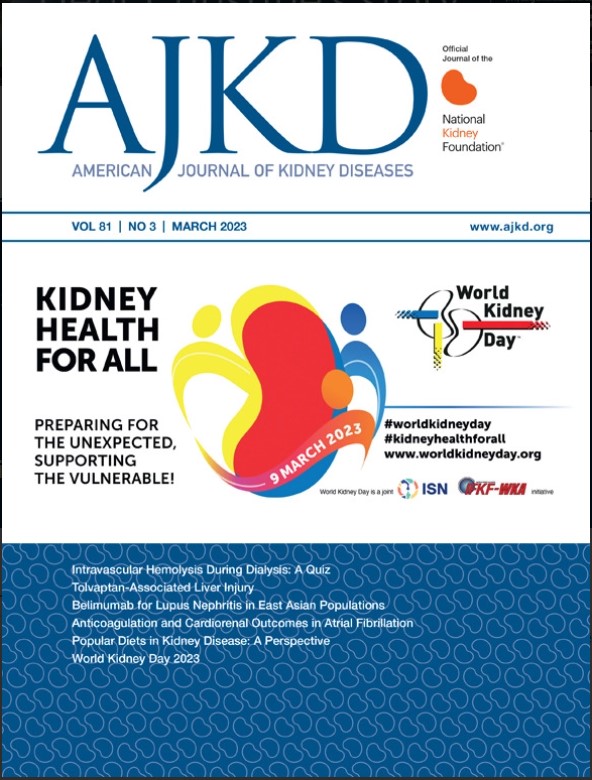慢性肾病患者对流感和COVID-19疫苗的认知:来自慢性肾功能不全队列(CRIC)研究的发现
IF 8.2
1区 医学
Q1 UROLOGY & NEPHROLOGY
引用次数: 0
摘要
理由与目的慢性肾脏疾病(CKD)患者接种疫苗的情况并不理想。了解与疫苗犹豫有关的观念有助于为旨在解决这些问题的规划提供信息。研究设计横断面调查。背景和参与者:来自慢性肾功能不全队列(CRIC)研究的一组参与者,从三个研究地点招募。根据健康信念模型,参与者对流感和COVID-19感染风险、疫苗的益处和危害、疫苗怀疑、获取障碍和行动线索的看法。结果流感和COVID-19疫苗犹豫,定义为不确定或不计划接种这些疫苗的未来剂量。分析方法采用李克特5分量表(1 =非常同意,2 =同意,3 =中立,4 =不同意,5 =非常不同意)来测量反应。使用线性回归模型分析有和没有疫苗犹豫的参与者的平均李克特量表得分的差异。结果在2022年7月至2023年6月期间,278名CRIC参与者完成了调查,其中47人(16.9%)和46人(16.8%)分别有流感和COVID-19疫苗犹豫。线性回归模型确定了与疫苗犹豫相关的关键认知,包括疫苗的感知危害(例如,疫苗导致流感;ΔMean李克特量表1.25 [95% CI, 0.96至1.55])和疫苗怀疑(例如,流感疫苗的益处被夸大了;0.96 [95% CI, 0.65至1.26])。感知益处与疫苗犹豫呈负相关(例如,流感疫苗预防严重疾病;-0.93[-1.23至-0.62])。超过40%的人认为他们没有患流感的风险,但这种看法与疫苗犹豫无关(0.02[-0.35至0.40])。这些发现与COVID-19总体上是一致的,尽管对疫苗的怀疑更为普遍,并且与疫苗犹豫更密切相关。研究人群由CKD患者组成,他们参加了一项队列研究,并自愿接受调查。结论在CKD患者中,对疫苗危害的认知和对疫苗的怀疑是导致疫苗犹豫的重要因素。通过量身定制的患者教育举措,改进准确疫苗信息的传播,可能会提高这一人群的疫苗接种率。本文章由计算机程序翻译,如有差异,请以英文原文为准。
Perceptions About Influenza and COVID-19 Vaccines Among People With CKD: Findings From the Chronic Renal Insufficiency Cohort (CRIC) Study.
RATIONALE & OBJECTIVE
Vaccine uptake among individuals with chronic kidney disease (CKD) is suboptimal. Understanding the perceptions associated with vaccine hesitancy can help inform programs aimed at addressing these concerns.
STUDY DESIGN
Cross-sectional survey.
SETTING & PARTICIPANTS
A subset of participants from the Chronic Renal Insufficiency Cohort (CRIC) Study, recruited from three study sites.
EXPOSURES
Participants' perceptions about influenza and COVID-19 infection risks, benefits and harms of vaccines, vaccine skepticism, access barriers, and cues to action, according to the Health Belief Model.
OUTCOME
Influenza and COVID-19 vaccine hesitancy, defined as being uncertain about or not planning to receive a future dose of these vaccines.
ANALYTIC APPROACH
Responses were measured on a 5-point Likert scale (1 = strongly agree, 2 = agree, 3 = neutral, 4 = disagree, 5 = strongly disagree). Linear regression models were used to analyze differences in mean Likert scale scores between participants with and without vaccine hesitancy.
RESULTS
Between July 2022 and June 2023, 278 CRIC participants completed the survey, of whom 47 (16.9%) and 46 (16.8%) had influenza and COVID-19 vaccine hesitancy, respectively. Linear regression models identified key perceptions associated with vaccine hesitancy, including perceived harms of the vaccines (e.g., the vaccine causes influenza; ΔMean Likert scale 1.25 [95% CI, 0.96 to 1.55]) and vaccine skepticism (e.g., benefits of the influenza vaccine are exaggerated; 0.96 [95% CI, 0.65 to 1.26]). Perceived benefits were negatively associated with vaccine hesitancy (e.g., influenza vaccines prevent serious illness; -0.93 [-1.23 to -0.62]). More than 40% perceived that they were not at risk of influenza, but this perception was not associated with vaccine hesitancy (0.02 [-0.35 to 0.40]). These findings were overall consistent for COVID-19, although vaccine skepticism was more prevalent and more strongly associated with vaccine hesitancy.
LIMITATIONS
The study population consisted of individuals with CKD who were enrolled in a cohort study and voluntarily responded to the survey.
CONCLUSIONS
Among individuals with CKD, perceptions of vaccine harms and vaccine skepticism were significant factors contributing to vaccine hesitancy. Improved dissemination of accurate vaccine information through tailored patient education initiatives may enhance vaccination uptake in this population.
求助全文
通过发布文献求助,成功后即可免费获取论文全文。
去求助
来源期刊

American Journal of Kidney Diseases
医学-泌尿学与肾脏学
CiteScore
20.40
自引率
2.30%
发文量
732
审稿时长
3-8 weeks
期刊介绍:
The American Journal of Kidney Diseases (AJKD), the National Kidney Foundation's official journal, is globally recognized for its leadership in clinical nephrology content. Monthly, AJKD publishes original investigations on kidney diseases, hypertension, dialysis therapies, and kidney transplantation. Rigorous peer-review, statistical scrutiny, and a structured format characterize the publication process. Each issue includes case reports unveiling new diseases and potential therapeutic strategies.
 求助内容:
求助内容: 应助结果提醒方式:
应助结果提醒方式:


